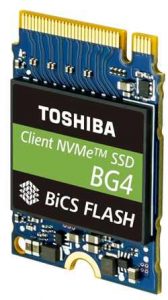CES: Toshiba Memory BG4 Series Up to 1TB BGA SSD
128, 256, 512, and 1024GB, up to 2,250MB/s and 1,700MB/s sequential RW, 380,000 and 190,000 random RW IO/s
This is a Press Release edited by StorageNewsletter.com on January 15, 2019 at 2:10 pmAt CES 2019, Toshiba Memory America, Inc., the U.S.-based subsidiary of Toshiba Memory Corporation, introduced the fourth generation of its single package ball grid array (BGA) SSD product line: the BG4 series.
The company’s lineup of compact NVMe SSDs places both the flash and a new controller into one package, bringing design flexibility to thin PC notebooks, embedded systems and server boot in data centers.
“The BGA form factor SSD enables larger amounts of flash to be added to smaller and thinner devices and extends battery life to improve the mobile experience,” said Jeff Janukowicz, research VP, SSD and enabling technologies, IDC. “NVMe BGA solutions, such as the new Toshiba BG4 series, provide OEMs with a better-than-SATA storage option that boosts demand for client SSD units. In fact, we expect this demand to increase at a 2017-2022 CAGR of 14%.“

The company has long been at the forefront of delivering SSDs that enable smaller, thinner, lighter, and more power efficient mobile designs. The firm was the first to develop a single package PCIe SSD, and the introduction of the fourth generation BG series represents another achievement as the densest client SSD by volumetric measurements (2). Utilizing the company’s 96-layer BiCS FLASH 3D memory, BG4 increases the maximum capacity from 512 to 1,024GB (3) and provides a slim , profile for capacities up to 512GB (4). Furthermore, the BG4 series doubles the PCIe Gen3 lane count from two to four, delivering more performance in the same power envelope when compared to the prior generation product.
Performance improvements (5) over BG3 series include:
-
Up to 2,250MB/s sequential read (50% improvement) and up to 1,700MB/s sequential write performance (6) (70% improvement)
-
Up to 380,000 random read IO/s (153% improvement) and 190,000 random write IO/s (7) (90% improvement)
“When it comes to performance, the BG4 series bests client SATA drives by a factor of up to 4×8 (8)” said Alvaro Toledo, VP, SSD marketing and product planning, Toshiba Memory America. “Better performance, along with its optimized power consumption and compact footprint, is why the BG4 SSDs are rapidly replacing SATA SSDs in notebook and desktop Pcs.“
BG4 SSDs feature a power-saving solution that improves power efficiency up to 20% in read and 7% in write (9) and provides a low-power state (10) as low as 5mW (when compared to the BG3 series). The BG4 also improves its Host Memory Buffer (HMB) technology by increasing the accelerated read access range and optimizing background flash management. Additionally, BG4 includes enhanced reliability features to protect against host DRAM failures when using the HMB feature.
“By continuously pushing the envelope of what is possible with flash and SSD technology, we are arming OEMs with the technology they need to gain a competitive advantage,” said Neville Ichhaporia, senior director, client and data center SSD marketing, Toshiba Memory America, Inc. “With BG4, we’re elevating the end-user experience with upgraded storage capacity and improved performance, while continuing to make power efficiency a priority.“
Providing essential options for today’s mobile devices, the company’s single package SSD is available in capacities of 128, 256, 512, and 1024GB (1TB), in either surface-mount BGA M.2 1620 (16x20mm) or removable M.2 2230 (22x30mm) modules.
Pyrite drive (version 1.00) or self-encrypting drive (TCG Opal version 2.01) models (11) are also available.
(1) Toshiba Memory Corporation survey, in the segment of single package SSDs, as of January 8, 2019.
(2) Company’s survey, in the segment of single package SSDs, as of January 8, 2019.
(3) Definition of capacity: The firm defines a 1GB as 1,000,000,000 bytes and 1TB as 1,000,000,000,000 bytes. A computer OS, however, reports storage capacity using powers of 2 for the definition of 1GB=2^30 bytes=1,073,741,824 bytes, 1TB=2^40 bytes=1,099,511,627,776 bytes and therefore shows less storage capacity. Available storage capacity (including examples of various media files) will vary based on file size, formatting, settings, software and OS, such as Microsoft OS and/or pre-installed software applications, or media content. Actual formatted capacity may vary.
(4) The thickness of the 128, 256 and 512GB single package models is 1.3mm, and the thickness of the 1,024GB single package model is 1.5mm.
(5) Based on the best performance of BG4 series (BG4 1024GB model) vs. BG3 series (BG3 512GB model) under Toshiba Memory Corporation test conditions.
(6) Company’s survey based on sequential read and write speeds of 128KB units, using BG4 1,024GB models under Toshiba Memory Corporation test conditions. Read and write speed may vary, depending on the host device, read and write conditions, and file size. The firm defines 1MB as 1,000,000 bytes and 1KB as 2^10 bytes, or 1,024 bytes. The sequential read and write performance mentioned herein are reference data, and may vary with the BG4 product data in the datasheet.
(7) Firm’s survey based on random read and write speeds of 4KB units, using BG4 1,024GB models under Toshiba Memory Corporation test conditions. Read and write speed may vary, depending on the host device, read and write conditions, and file size. IO/s is Input Output Per Second (or the number of I/O operations per second) and Toshiba Memory Corporation defines 1KB as 2^10 bytes, or 1,024 bytes. The random read and write performance mentioned herein are reference data, and may vary with the BG4 product data in the datasheet.
(8) Based on the best sequential performance of BG4 1,024GB model vs. the theoretical maximum bandwidth of 6Gb SATA SSD.
(9) Based on the power/performance ratio of BG4 PCIe Gen3x4 lanes model vs. BG3 PCIe Gen3x2 lanes model under Toshiba Memory Corporation test conditions.
(10) Toshiba Memory Corporation survey under the test conditions of link power management state L1.2 in non-operation power state.













 Subscribe to our free daily newsletter
Subscribe to our free daily newsletter
